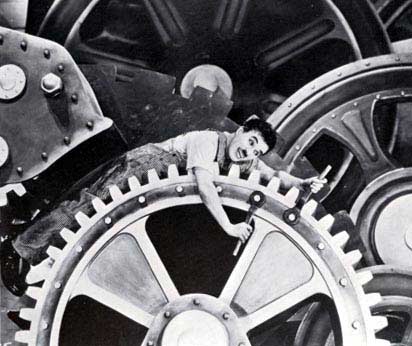Starring: Charlie Chaplin, Paulette Goddard, Henry Bergman
Directed by: Charlie Chaplin
Plot Summary: A factory worker employed on an assembly line suffers a nervous breakdown and is sent to a hospital to recuperate. After a mistaken encounter with the police, he is taken to jail and released on good behavior. He then meets a gamin girl and they begin searching for jobs and homes in pursuit of the "American Dream" during an economic nightmare.
For the final film in my first look at the silent era, I thought it would be best to end with arguably the most famous contributor to the era, Charlie Chaplin. Like Buster Keaton, Chaplin served as one of the era's greatest comedians and filmmakers. My introduction to Chaplin came through his film Modern Times, which I recently viewed in my American Literature class (isn't it amazing when stuff works out perfectly like that). Going into it, I wasn't expecting Chaplin to be better than Keaton, but I was looking for something to differentiate the two and luckily, I wasn't disappointed.
 Charlie Chaplin, usually referred to as The Little Tramp, is portrayed as a quirky factory worker. Chaplin's brand of comedy is significantly different from Keaton's. While Keaton was able to do physical comedy with a stone face, Chaplin uses all forms of physical comedy. He has many scenes involving stunt work, such as riding on a hook and chain, and another scene involving roller blades. It is his facial expressions that convey humor, as he is able to showcase a range of emotions through various facial responses. We all know what Chaplin's Little Tramp looks like thanks to his trademark hat, cane, and mustache. All these elements add a quality of a comedic icon to the film. Chaplin is the reason that the comedy works, and naturally, he's the main reason that the audience wants to see the film in the first place.
Charlie Chaplin, usually referred to as The Little Tramp, is portrayed as a quirky factory worker. Chaplin's brand of comedy is significantly different from Keaton's. While Keaton was able to do physical comedy with a stone face, Chaplin uses all forms of physical comedy. He has many scenes involving stunt work, such as riding on a hook and chain, and another scene involving roller blades. It is his facial expressions that convey humor, as he is able to showcase a range of emotions through various facial responses. We all know what Chaplin's Little Tramp looks like thanks to his trademark hat, cane, and mustache. All these elements add a quality of a comedic icon to the film. Chaplin is the reason that the comedy works, and naturally, he's the main reason that the audience wants to see the film in the first place.Many wouldn't expect a comedy set during the Great Depression to be that funny, but I think that's what makes it work. While it is set during a time of financial crisis, it is satirical of what the time can bring about. There are scenes where Chaplin is blatantly stating that being locked away in a jail cell is more comfortable and homey than being out in the world starving and homeless, struggling to find work. It's one of the earliest dark comedies I've ever seen and it is his innocence and ambition for a better life that makes his time during the Great Depression seem bearable, as we hope he can overcome poverty.
Chaplin's hope and innocence plays a significant role in two of the film's key highlights. The first is in his romance with the gamin girl, played by Paulette Goddard. The second is in providing a central theme full of heart. There is a point in the film where all hope seems lost, but Chaplin nonchalantly sneaks in the idea that you can get through anything as long as you are with the right person, in his case the gamin girl, and most importantly, you must keep smiling and moving forward. In a movie nowadays, that would seem overly cheesy, but at the time, it could be argued that it was the theme we needed during the Great Depression.
Rating: 4.5 out of 5 stars
Modern Times not only serves as a statement of the Great Depression, but also offers a tongue-in-cheek ending concerning the growing popularity of sound films. It's a great film and one that I would recommend all fans of comedy should see once, and hopefully own in their collection.
Comment below to share your thoughts on the movie or to discuss a topic that I left out of my review
Modern Times and movie images are copyrighted by United Artists, MK2 Editions, and Janus Films/Criterion
No comments:
Post a Comment